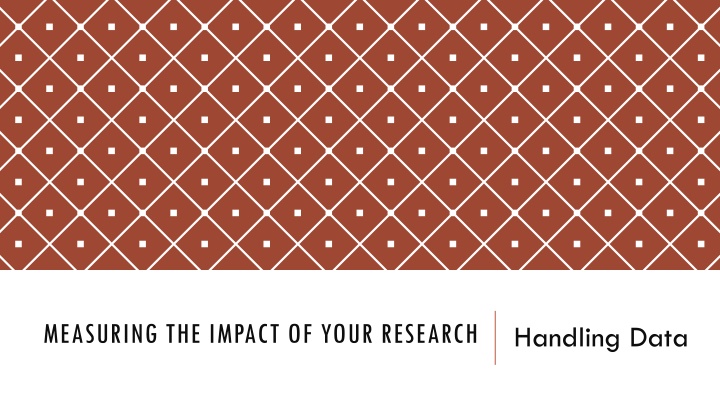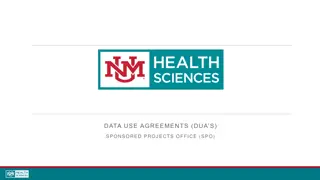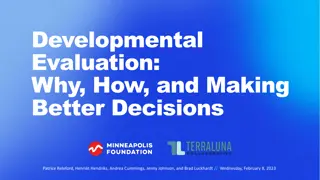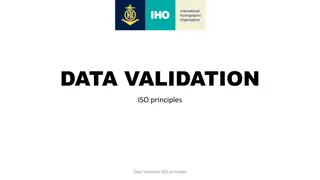Handling Data for Research Impact Evaluation
Uncover the essence of data management in research activities. Learn how to create a Data Management Plan (DMP) to enhance data usability, access, and longevity throughout the research lifecycle.
Download Presentation

Please find below an Image/Link to download the presentation.
The content on the website is provided AS IS for your information and personal use only. It may not be sold, licensed, or shared on other websites without obtaining consent from the author.If you encounter any issues during the download, it is possible that the publisher has removed the file from their server.
You are allowed to download the files provided on this website for personal or commercial use, subject to the condition that they are used lawfully. All files are the property of their respective owners.
The content on the website is provided AS IS for your information and personal use only. It may not be sold, licensed, or shared on other websites without obtaining consent from the author.
E N D
Presentation Transcript
MEASURING THE IMPACT OF YOUR RESEARCH Handling Data
SCOPE OF THE PRESENTATION Understanding the Nature of Data Creating a Data Management Plan (DMP) How to Make a Data Dictionary Sharing Data HANDLING DATA THANDIWE MENZE 2 Research Week 08 12 May 2017
UNDERSTANDING THE NATURE OF DATA HANDLING DATA THANDIWE MENZE 3 Research Week 08 12 May 2017
NATURE OF DATA Data have a longer lifespan than the research project that created them o Data often outlive research projects Researchers often continue to work on data long after funding for the project has ceased o Follow-up projects may analyse or add to the data o Data may even be re-used by other researchers http://www.data-archive.ac.uk/create-manage/life-cycle HANDLING DATA THANDIWE MENZE 4 Research Week 08 12 May 2017
FULL RESEARCH DATA LIFECYCLE Designing Data Management Plans Data Capture Data Storage Metadata creation Data Repurposing/Re-use Data Citation Creating Data Re-using Data Data Storage Metadata Creation Data Cleansing Data Verification Data Validation Data Anonymisation Processing Data New Knowledge Data Sharing Link Data to Outputs Giving Access to Data Analysing Data Data Interpretation & Analyis Data Publishing Data Visualisation Preserving Data Data Archiving Data Preservation Metadata Creation Link data to outputs Based on UK Data Archive Lifecycle
CREATING A DATA MANAGEMENT PLAN (DMP) HANDLING DATA THANDIWE MENZE 6 Research Week 08 12 May 2017
DATA MANAGEMENT PLAN (DMP) DMP is a living and written document explaining what the researcher intends to do with his/her data during and following the research project DMPs are required by many funders, such as the NRF (National Research Foundation) DMP could potentially: o Save you time and effort during your research as it forces you to organise your data o Prepare your data for the next step in its lifecycle o Clarify who will have access to it, how, and when Importantly, a DMP clarifies who will access to it, how and when DMP will ensure that data remains useable for yourself, your collaborators, and other researchers beyond the and of your project HANDLING DATA THANDIWE MENZE 7 Research Week 08 12 May 2017
DATASETS GENERATED BY YOUR RESEARCH Describe the source of each dataset Describe how each dataset will be generated by your research Categorise each dataset Observational Experimental Simulated Compiled Describe the type of dataset generated Text (field/laboratory notes or survey responses) Numeric (tables, counts, or measurements) Audiovisual (images, sound recordings, videos) Models, computer code Discipline-specific (FITS in astronomy, CIF in chemistry) Instrument-specific (equipment outputs) Categorise the stability of each dataset Fixed datasets (never change after collection) Growing dataset (new data added without updating the old data) Revisable dataset (new data added, while old data is changed or deleted) HANDLING DATA THANDIWE MENZE 8 Research Week 08 12 May 2017
HOW TO MAKE A DATA DICTIONARY HANDLING DATA THANDIWE MENZE 9 Research Week 08 12 May 2017
DATA DICTIONARY: DEFINED A data dictionary allows others to understand your data and is critical to making your research more reproducible The purpose of a data dictionary is to explain what all the variable names and values in your spreadsheet really mean HANDLING DATA THANDIWE MENZE 10 Research Week 08 12 May 2017
DATA DICTIONARY: EXAMPLE HANDLING DATA THANDIWE MENZE 11 Research Week 08 12 May 2017
SHARING DATA HANDLING DATA THANDIWE MENZE 12 Research Week 08 12 May 2017
SHARING DATA: EXPLAINED Sharing data is the practice of making data generated by your research project available to other researchers oTo allow for replication, for example Funding agencies and scientific journal publishers require researchers to share any supplemental information (raw data, statistical methods or source code) HANDLING DATA THANDIWE MENZE 13 Research Week 08 12 May 2017
DEVELOPING A DATA SHARING PLAN Data sharing strategies vary according to the type of data collected, but the following should be considered: o Volume, type, content and format of the final dataset o The standards that will be used for data collection and management o The metadata, documentation or other supporting material that should accompany the data for it to be interpreted correctly o The method used to share data o The timescale for public release of data o The long-term preservation plan for the dataset o Any reasons why there should be restrictions on data sharing o Proprietary data in terms of restrictions due to collaborations with for profit organisations oConfidentiality, ethical or consent issues that may arise with the use of data involving human subjects HANDLING DATA THANDIWE MENZE 14 Research Week 08 12 May 2017























